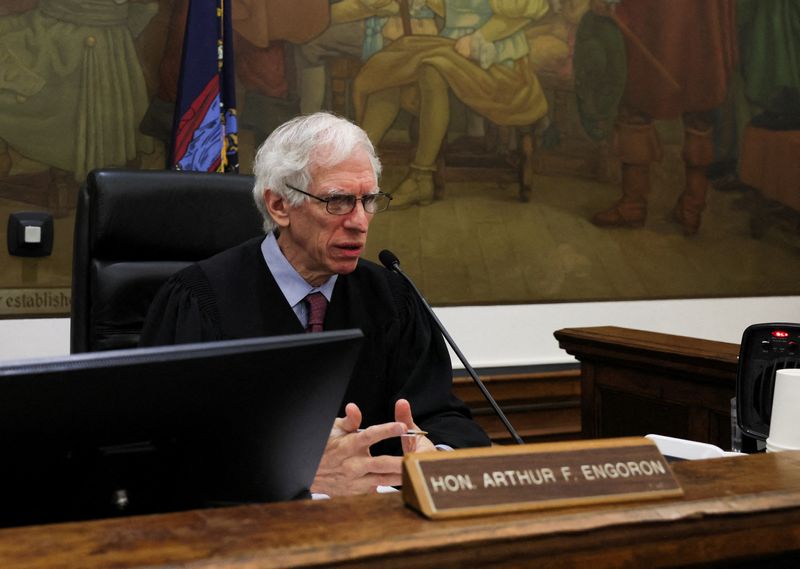By Jonathan Stempel
NEW YORK (Reuters) - Arthur Engoron, a cabdriver-turned-judge who found Donald Trump liable for fraud, did not hold back in accusing the former U.S. president of trying to take him for a ride.
In ordering Trump and his family business to pay a $355 million penalty, Engoron displayed the wit, humor and disbelief he has often shown in more than three years overseeing the civil fraud case brought by New York Attorney General Letitia James against Trump, including a trial spanning three months.
"The English poet Alexander Pope first declared, 'To err is human, to forgive is divine,'" Engoron wrote near the end of his 92-page, single-spaced decision.
"Defendants apparently are of a different mind," the judge continued. "Their complete lack of contrition and remorse borders on pathological."
James, an elected Democrat, sued Trump, his adult sons Donald Jr. and Eric, the Trump Organization and others, saying they violated state law by overstating the value of Trump's properties in order to inflate his net worth and obtain better loan and insurance terms.
Her case thrust Engoron, 74, into a spotlight he had never seen while driving a taxi in the 1960s to make some money while attending Columbia University, or since graduating in 1979 from New York University's law school.
Nor did it shine so brightly when he played the keyboard for what he has called a "moderately successful" bar band.
A Democrat, Engoron has spent two decades on the bench. He was elected to the state Supreme Court in Manhattan in 2015.
CRACKING DOWN
Trump, the frontrunner for the Republican nomination to challenge Democratic President Joe Biden in the Nov. 5 U.S. election, and his entourage repeatedly tested Engoron's patience and rulings before and throughout the trial.
Trump wrote on social media that Engoron is "DERANGED," and he and his lawyers portrayed the judge's principal clerk Allison Greenfield as biased. Trump even falsely called Greenfield the "girlfriend" of Democratic Senator Chuck Schumer.
Engoron fined Trump $15,000 for twice violating a gag order against deriding court staff.
There was no let-up in the days leading up to Jan. 11 closing arguments, as Trump's lawyers beseeched Engoron to let Trump speak in court, a matter within the judge's discretion.
Engoron said he would, provided that Trump stuck to the case and did not made a campaign speech or air grievances, and that if he verbally attacked court staff he would face a minimum $50,000 fine.
The former president's lawyers resisted, and Engoron decided that Trump could not speak. But at the last moment, the lawyers asked again if he could, and Engoron asked Trump if he could follow the rules. Ultimately, Trump could not.
Trump insulted Engoron by telling him "you have your own agenda" and "can't listen for more than one minute." Trump also declared himself "an innocent man" and said he was the victim of "a fraud on me" by James.
"Control your client," Engoron told Trump's lawyer Christopher Kise.
Earlier that day, authorities responded to a fake bomb threat at Engoron's home in New York's Nassau County.
TRUMP 'INCAPABLE' OF ADMITTING ERROR
Engoron's refusal to be cowed mirrored that of U.S. District Judge Lewis Kaplan, who in January oversaw the defamation trial held down the street in which the writer E. Jean Carroll won an $83.3 million jury verdict from Trump, which he plans to appeal.
Kaplan once warned Trump he could be thrown out of the courtroom for speaking loudly enough for jurors to hear, and on multiple occasions told his lawyers they could face consequences for making specious arguments or ignoring his orders.
Engoron, too, faulted Trump for his courtroom behavior, saying Trump's refusal to answer questions directly and insistence on making irrelevant speeches while testifying "severely compromised his credibility."

In Carroll's case, the jury had the final word. In the case brought by James, where there was no jury, Engoron did:
"Defendants did not commit murder or arson. They did not rob a bank at gunpoint. Donald Trump is not Bernard Madoff. Yet, defendants are incapable of admitting the error of their ways. Instead, they adopt a 'See no evil, hear no evil, speak no evil' posture that the evidence belies."